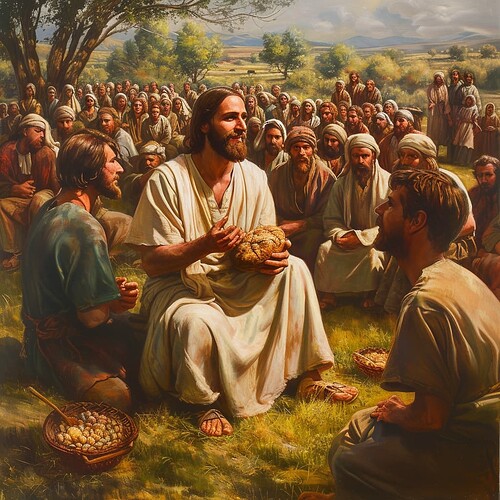![]() February 10: Mark 6 - Miracles, Multiplications, and Missions
February 10: Mark 6 - Miracles, Multiplications, and Missions
![]() Introduction
Introduction
In Mark 6, we find ourselves in the midst of a flurry of events that bespeak of Jesus’ divine authority and missionary zeal. In this power-packed chapter, Jesus challenges conventions, performs awe-inspiring miracles, and sends out disciples on a mission, setting the stage for a transformative spiritual journey ahead.
![]() Jesus Rejected in Nazareth
Jesus Rejected in Nazareth
Jesus begins teaching in his hometown synagogue, but His wisdom and miracles are met with disbelief and rejection. They saw Him only as a carpenter, as Mary’s son, unable to grasp His divine identity.
![]() Key Verse: Mark 6:4 "Jesus said to them, ‘A prophet is not without honor except in his hometown and among his own relatives and in his own household.’ "
Key Verse: Mark 6:4 "Jesus said to them, ‘A prophet is not without honor except in his hometown and among his own relatives and in his own household.’ "
![]() Sending Out the Twelve
Sending Out the Twelve
Jesus commissions the twelve disciples to go out and spread His teachings, giving them the authority over unclean spirits, a clear demonstration of their mission and God’s power working through them.
![]() *Key Verse: Mark 6:7 “And He called the twelve to Himself, and began to send them out two by two, and gave them power over unclean spirits.” *
*Key Verse: Mark 6:7 “And He called the twelve to Himself, and began to send them out two by two, and gave them power over unclean spirits.” *
![]() Key Themes and Reflections
Key Themes and Reflections
-
Faith over Familiarity: The rejection in Nazareth emphasises the danger of familiarity breeding contempt. It challenges us today not to become blind to the divine amidst the ordinary.
-
Divine Provision: The feeding of the five thousand reveals God’s abundant grace and provision, a reminder for us to trust in Him in times of scarcity.
-
Embodiment of Compassion: Jesus healing the sick in Gennesaret underscores His deep compassion, reminding us to be conduits of His love in the world.
![]() Today’s Application
Today’s Application
Today, we are called to be missionaries in our own right. With faith and compassion, we can share God’s love in myriad ways - merely being kind to someone or volunteering in our local community can make a difference. We are also encouraged to trust in God’s provision and care, even in times of scarcity or hardship.
![]() Hidden Gem
Hidden Gem
Interestingly, when Jesus feeds the five thousand, the gospel of Mark mentions that they sat down in “greens grass," pointing to it being springtime and aligning with the timeline of the Passover, adding an extra layer of meaning behind this miracle.
![]() Reflective Q&A
Reflective Q&A
![]() The significance of Jesus walking on water?
The significance of Jesus walking on water?
A: The incident is not merely focused on the disciples’ fear or the storm but primarily on who Jesus is - the Son of God, who has authority over nature.
![]() What can we learn from the feeding of the five thousand?
What can we learn from the feeding of the five thousand?
A: The miracle invites us to trust God’s provision and encourages us to share generously with those around us.
![]() What are the implications of Jesus being rejected in Nazareth?
What are the implications of Jesus being rejected in Nazareth?
A: The event emphasises the danger of familiarity breeding contempt is prevalent in spiritual matters too. It underscores the need for us to preserve our faith and respect towards divine despite the ordinary circumstances.
![]() Join the Discussion
Join the Discussion
How have you experienced divine providence in your life? Share your thoughts and testimonials here for a vibrant community discussion.
![]() See You Tomorrow in Mark 7
See You Tomorrow in Mark 7
As we continue our journey through the Gospel, we will explore Jesus’ teaching on what makes a person clean or unclean. Let’s delve deeper into His profound lessons and how they affect our understanding of spirituality and righteousness.
Stay tuned, Stay blessed!
